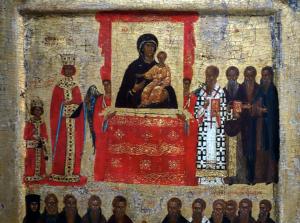
Apparent orthodoxy, right belief, without orthopraxis, right action, is not true orthodoxy. What we do demonstrates who we are and what we believe. The defeat of iconoclasm, the heresy which denied the veneration of images, led to the restoration of icons and their proper use. Orthodoxy is tied with orthopraxis, and indeed, explains and justifies orthopraxis even as heresy is tied to and justifies bad actions (as seen in the example of iconoclasm where the rejection of the veneration of images led to their destruction). The First Sunday of Lent in the Byzantine tradition, the Sunday of Orthodoxy, was established to commemorate the end of iconoclasm because that happened on the first Sunday of the Great Fast in 843. We remember all forms of orthodoxy and the way the orthodox teaching has been defended through the ages through the example of the iconophiles who not only defended orthodoxy, but exemplified it through their use of images. The truth of orthodoxy is vindicated by orthopraxis; without proper praxis, it is clear we have yet to embrace and promote the fullness of the truth. Thus, for example, we cannot say we believe in and love God if we deny justice and love to those whom God loves, even as we cannot say we believe in the incarnation if we deny the value of our earthly actions.
Therefore, on this day, we are also reminded of the great deeds of those who came before us, of those who came before the Christian faith, to show us that in and through their actions, they confirmed their faith and deserve to be honored and respected. Some of them, to be sure, endured great trials and tribulations for the sake of their faith, but we must remember, just as they were vindicated by God, so all who combine orthodoxy with orthopraxis will be rewarded by God for their fidelity:
And what more shall I say? For time would fail me to tell of Gideon, Barak, Samson, Jephthah, of David and Samuel and the prophets — who through faith conquered kingdoms, enforced justice, received promises, stopped the mouths of lions, quenched raging fire, escaped the edge of the sword, won strength out of weakness, became mighty in war, put foreign armies to flight (Heb. 11:32-34 RSV).
Faith and deeds go together; without faith, there will be no deeds, which is why it can be said that if we do not engage orthopraxis, with deeds which exemplify our faith, we show our own lack of faith. We, like the greats in the past, should be interested in justice, quench the fire of rage, seek to escape the edge of the sword with peace, and become strong in spiritual warfare so that sin, our enemy, shall flee. It’s not good enough just to hear the teachings of the faith and memorize them; if we embrace orthodoxy we will consider the implications of the teachings of the faith and act upon them. If we truly believe in the incarnation, that God became one of us so as to embrace us all and lift us up to heaven, we will look into the world and find ways for us to follow after Jesus, the God-man, and share the grace we have received with the world in order to have it lifted it up with us. If we believe God became one of us, that God assumed human nature, then we will believe that in and through humanity the presence of God can be known, indeed, even seen, and we will show it respect. We will respect it in and through images, but also in and through doing good for all the people around us, especially those most in need, knowing that they have the image of God in them. That is, we do not fully embrace the veneration of images, the teaching of orthodoxy, if we do not follow through and honor the image and likeness of God found in every person, that is, we do not honor God if we do not truly promote justice and love everyone in and through that promotion.
As we follow after Jesus, we will try to do what he has told us to do, acting with charity towards others; truly when we do so, we show our faith in him. The more we do so, the more will see and experience the world around us differently. We will see the unity of heaven and earth. We will discern invisible realities and see how they are intertwined with material ones. The promise Jesus gave Nathaniel was true for Nathaniel, but it is also true with us. “Truly, truly, I say to you, you will see heaven opened, and the angels of God ascending and descending upon the Son of man” (Jn. 1:51b RSV). We will see and discern what the author of book of Hebrews says is the great cloud of witnesses, realizing how everything is connected with and united to Jesus in the incarnation. For in Jesus, heaven and earth are one because the eschaton has been immanentized. We must realize the truth of the immanentization of the eschaton, for when we do, we will not flee the world but rather seek to embrace it in a new way, a new modality, one which allows us to embrace the spiritual and material elements of being together as one. Then we shall truly see the heavens opened up and the angels descending onto the earth in and through the union of heaven and earth found in the Son of Man, Jesus Christ:
Therefore, since we are surrounded by so great a cloud of witnesses, let us also lay aside every weight, and sin which clings so closely, and let us run with perseverance the race that is set before us, looking to Jesus the pioneer and perfecter of our faith, who for the joy that was set before him endured the cross, despising the shame, and is seated at the right hand of the throne of God (Heb. 12:1-2 RSV).
Let us, therefore, proclaim the truth of the incarnation and live it out; let is follow through with an orthodoxy united with orthopraxis. Let us discern the implications of the faith and realize them in our lives. Let us cast out all sin, all unlove, from ourselves so that we can truly discern and see Jesus in and with everything. This will our faith grow to perfection, and in that perfection, we will find ourselves lifted up with Jesus and become co-heirs with him in the kingdom of God (cf. Rom. 8:17).
Stay in touch! Like A Little Bit of Nothing on Facebook.
If you liked what you read, please consider sharing it with your friends and family!













